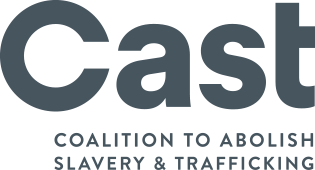What is ‘Forced Criminality’?
One of the most misunderstood aspects of human trafficking is “forced criminality.” Also known as criminal exploitation, forced criminality happens when people are coerced into illegal activities like using or transporting illegal drugs, committing identity theft and violent crimes, or engaging in illegal sex work.
In a disturbing miscarriage of justice, survivors of forced criminality are often wrongly identified as criminals and face arrest and imprisonment for the crimes they were forced to carry out. For more info, check out our interactive dashboard.
Interactive Dashboard on Forced Criminality
Last year, the Urban Institute and the Microsoft Justice Reform Initiative selected Cast as one of 25 organizations across the country to participate in the Catalyst Grant Program to use data and technology to advance racial equity and reform in the criminal legal system in three front-end focus areas: prevention, policing, and prosecution.
With the support of survivor leaders, legal professionals, and researchers, we examined how Cast collects information from our clients about their experiences of forced criminality. Our findings are in our interactive infographic dashboard, where you can view Cast’s client data on forced criminality, broken down by sex and labor trafficking, age, gender, national origin, and more.
If you want to learn more about documenting forced criminality, read our Guide for Anti-Trafficking Practitioners.
Cast Conversations: A Deeper Dive on Human Trafficking Issues
Cast’s Research and Evaluation Manager, Dr. Ethan Levine, chatted with some of our project team members about their experiences with forced criminality. These Cast Conversations are also available on our YouTube Channel.
Nagwa Ibrahim is Cast’s Director of Legal Services.
Jenna Bruce is Cast’s 2023-24 Legal Fellow, President of Rotarians Fighting Human Trafficking, and a survivor of human trafficking.
Ron Kalemba is the Co-Facilitator of the Learning and Training Group for the National Survivor Network and a paid consultant on survivor-led projects.
